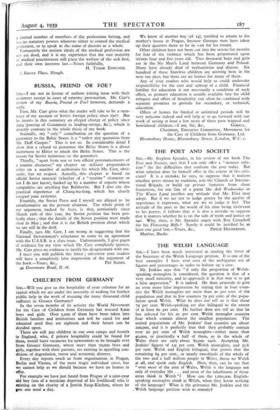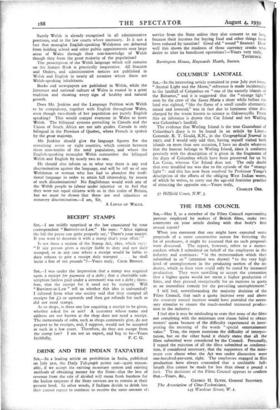THE WELSH LANGUAGE SI11,—I have been much interested in reading
the letter of the Secretary of the Welsh Language petition. It is one of the best examples I have ever seen of the ambiguous use of figures and percentages in order to bolster up a case.
Mr. Jenkins says that " if only the proportion of Welsh- speaking monoglots is considered, the question is that of a
very small minority, and to approach it in that way is to get a false impression." It is indeed. He then proceeds to give an even more false impression by stating that in four coun- ties the Welsh monoglots are more than 20 per cent. of the population and that in five counties 79 per cent. of the popu- lation speak Welsh. What he does not tell us is that those 79 per cent. Welsh-speaking are also bilingual to the extent of at least 6o per cent. He further does not tell us that he has selected for his 20 per cent. Welsh monoglot counties four which contain almost the smallest populations. The united populations of Mr. Jenkins' four counties are about zoo,000, and it is perfectly true that they probably contain over zo per cent. of Welsh monoglots—rather more than 40,000, or practically a half of them, as in the whole of Wales there are only about 8o,000 such. Accepting Mr. Jenkins' figures of 3.9 per cent. Welsh monoglots, and 32.8 per cent. Welsh and English bilingual, that proves that the remaining 64 per cent., or nearly two-thirds of the whole of the two and a half million people in Wales, know no Welsh at all, and speak only English. How, then, can he say that "over most of the area of Wales, Welsh is the language not only of everyday life . . . and most of the inhabitants of those areas think in Welsh "? How can the i,600,000 English- speaking monoglots think in Welsh, when they know nothing of the language? What is the grievance Mr. Jenkins and the Welsh language petition wish to remedy?
Surely Welsh is already recognised in all administrative positions, and in the law courts where necessary. Is it not a fact that monoglot Fnglish-speaking Welshmen are debarred from holding school and other public appointments over large areas of Wales through their non-knowledge of Welsh though they form the great majority of the population?
The proscription of the Welsh language which still remains on the Statute Book is practically inoperative. All Statutes and Orders, and administrative notices are published in Welsh and English in nearly all counties where there are Welsh-speaking inhabitants.
Books and newspapers are published in Welsh, while the 'iterature and national culture of Wales is rooted in a great tradition and showing every sign of healthy and natural growth.
Does Mr. Jenkins and the Language Petition wish Welsh to be compulsory, together with English throughout Wales, even though two-thirds of her population are purely English speaking? This would compel everyone in Wales to learn Welsh. The bilingual systems prevailing in Canada and the Union of South Africa are not safe guides. Canada is only bilingual in the Province of Quebec, where French is spoken by the great majority.
Mr. Jenkins should give the language figures for the remaining seven or eight counties, which contain between them nine-tenths of the total population, and where the English-speaking monoglot Welsh outnumber the bilingual Welsh and English by nearly two to one.
He should also inform us in what way there is any real discrimination against the language, and will he tell us of any Welshman or woman who has had to abandon the tradi- tional language in order to attain full citizenship, by reason of such discrimination? No Englishman would wish any of the Welsh people to labour under injustice or to feel that they were not equal citizens with us in this realm of Britain, but we must be shown that there are real injustices or statutory discrimination.—I am, Sir,
A LOVER OF WALES.









































 Previous page
Previous page